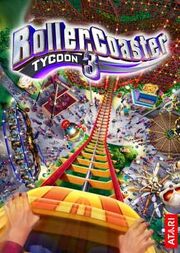
Box art for Roller Coaster Tycoon 3, released in 2004
RollerCoaster Tycoon is a successful video game franchise, first developed by Chris Sawyer and MicroProse and distributed through Hasbro Interactive. The first game in the franchise, RollerCoaster Tycoon, was later followed by multiple expansions and two sequel games, developed either by Sawyer himself or with Sawyer on-board as Executive Producer. The latest sequel in the franchise, RollerCoaster Tycoon 3, was released in 2004, and the final official update to that game was in 2005. However a thread appeared on the Atari website about a 4th Game.
Development
The original title was released in 1999, with two expansion packs following in 1999 and 2000. In 2001, Hasbro Interactive and MicroProse were sold to Infogrames Interactive, a French gaming company, which was later renamed Atari Interactive Inc. in 2003. RollerCoaster Tycoon 2, the original game's sequel, was released in 2002 under the Infogrames banner; it spawned two Expansion Packs also released under Infogrames. Finally, in 2004 RollerCoaster Tycoon 3 was released under the Atari title, as were its two Expansion Packs.
Game Listing
- Official series
- RollerCoaster Tycoon
- Corkscrew Follies/Added Attractions
- Loopy Landscapes
- RollerCoaster Tycoon 2
- RollerCoaster Tycoon 3
- RollerCoaster Tycoon (4) World (upcoming)
- RollerCoaster Tycoon
- Console games
- Handy games
Series Reception
The success of the original RollerCoaster Tycoon series sparked its sequel, RollerCoaster Tycoon 2, which was released in 2002. The sequel was criticized due to its similarity to its predecessor, as it utilized a similar game engine and nearly-identical graphics. However, the sequel was successful, and led to two official expansion packs, as well as the User Created Expansion Set (UCES), a player-made set of scenarios, custom rides and scenery. The isometric perspective of the original two games was scrapped for a 3D engine, a new graphical 'feel', and a new game design in RollerCoaster Tycoon 3, which debuted in 2004 and which spawned two expansion packs. The last official update to the series was RollerCoaster Tycoon 3: Wild! in 2005.
Fan Reception
RollerCoaster Tycoon offered limited tools for custom content in the way of new scenario or scenery creations. However, saved ride designs could be traded between games. RollerCoaster Tycoon 2 provided many tools for customization and fan-created content, and made it easier to implement user-created content into the game, sparking the creation of the UCES.
Critical Reception

|
This article is under construction. You can help by editing it! Relevant discussion may be available on this article's comment section below. |
